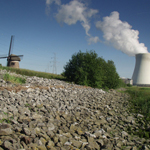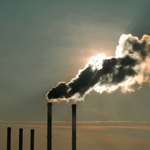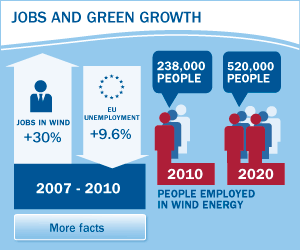 This weekend marked one year on from the terrible earthquake and tsunami in Japan and the ensuing nuclear accident at the Fukushima Daiichi plant. At Fukushima, a series of nuclear meltdowns, equipment failures and releases of radioactive materials made the disaster the largest since the Chernobyl accident in 1986.
This weekend marked one year on from the terrible earthquake and tsunami in Japan and the ensuing nuclear accident at the Fukushima Daiichi plant. At Fukushima, a series of nuclear meltdowns, equipment failures and releases of radioactive materials made the disaster the largest since the Chernobyl accident in 1986.
The media has been awash with stories on nuclear including the Economist which carries a special report into nuclear power under the title “the dream that failed”. It contains many reasons why nuclear is not the answer to the world’s energy dilemma, but the loudest message is on costs, here are just a few quotes:
continue reading »

At the end of last week EU environment ministers met to discuss how to fix the EU’s emissions trading system (ETS) by raising the price of carbon. The EWEA blog spoke to Rémi Gruet, EWEA’s senior regulatory affairs advisor on climate change, to discover just what the ETS does and why the EU needs a higher carbon price.
What is the emissions trading system?
The ETS is a kind of market that puts a price on carbon emissions. Big polluters – mainly the power sector – are legally required to limit their carbon emissions. If they emit less than their limit they can sell carbon ‘permits’ on the market, and if they emit more they can buy carbon ‘permits’.
continue reading »
 This is an excerpt of a post by Heikki Willstedt, director of energy policy, AEE. To read the full post (in Spanish) click here.
This is an excerpt of a post by Heikki Willstedt, director of energy policy, AEE. To read the full post (in Spanish) click here.
Oil has reached €90 a barrel and, when the embargo on Iran becomes effective, there are analysts who predict it will rise to €100 a barrel. Energy imports cost more in Spain than they do in emerging countries, so we cannot improve either our competitiveness or our trade balance deficit. In Spain there are no indigenous oil resources, but we do have the wind to generate electricity. A Spanish wind turbine of 2 MW generates the energy equivalent to 7,000 barrels a year. Wind is the Spanish oil.
The International Monetary Fund defines an oil shock as a 26% or more increase in the price of oil. We have had three: 2008, 2010 and 2011. The current price of oil price in Euros is at a historic high. Just remember that in July 2008 a barrel of oil reached €84 a barrel. We are now 7% above the previous peak price.
continue reading »
 A new report claims that the UK could meet its 2020 carbon reduction targets at a lower cost by building new nuclear plants and gas-fired power stations instead of wind farms, but the report has met strong criticism.
A new report claims that the UK could meet its 2020 carbon reduction targets at a lower cost by building new nuclear plants and gas-fired power stations instead of wind farms, but the report has met strong criticism.
The study, published by AF Consult and picked up by the Sunday Times newspaper, says that opting for new nuclear and gas would be £45 billion (€54 billion) cheaper than wind farms, despite the fact that in reality new nuclear power plants take years to build and gas prices are pushing up energy prices. The UK government said recently that average bills rose by €537 between 2004 and 2011 and 64 % of that increase was down to rises in gas prices. Meanwhile, just 6.5% of the increase was attributed to support for renewable energy.
continue reading »
 Annual statistics recently released by the Global Wind Energy Council (GWEC) once again show the massive growth in cumulative wind power capacity in Asia, to 82,398 MW last year from 61,106 MW at the end of 2010.
Annual statistics recently released by the Global Wind Energy Council (GWEC) once again show the massive growth in cumulative wind power capacity in Asia, to 82,398 MW last year from 61,106 MW at the end of 2010.
When matched with Asia’s continuing population increases, the GWEC statistics seem to indicate that the region as a whole is well placed to incorporate even greater amounts of wind power into its grids in coming decades as the world replaces dirty carbon energy sources with green sustainable electricity.
continue reading »
 This weekend marked one year on from the terrible earthquake and tsunami in Japan and the ensuing nuclear accident at the Fukushima Daiichi plant. At Fukushima, a series of nuclear meltdowns, equipment failures and releases of radioactive materials made the disaster the largest since the Chernobyl accident in 1986.
This weekend marked one year on from the terrible earthquake and tsunami in Japan and the ensuing nuclear accident at the Fukushima Daiichi plant. At Fukushima, a series of nuclear meltdowns, equipment failures and releases of radioactive materials made the disaster the largest since the Chernobyl accident in 1986.









